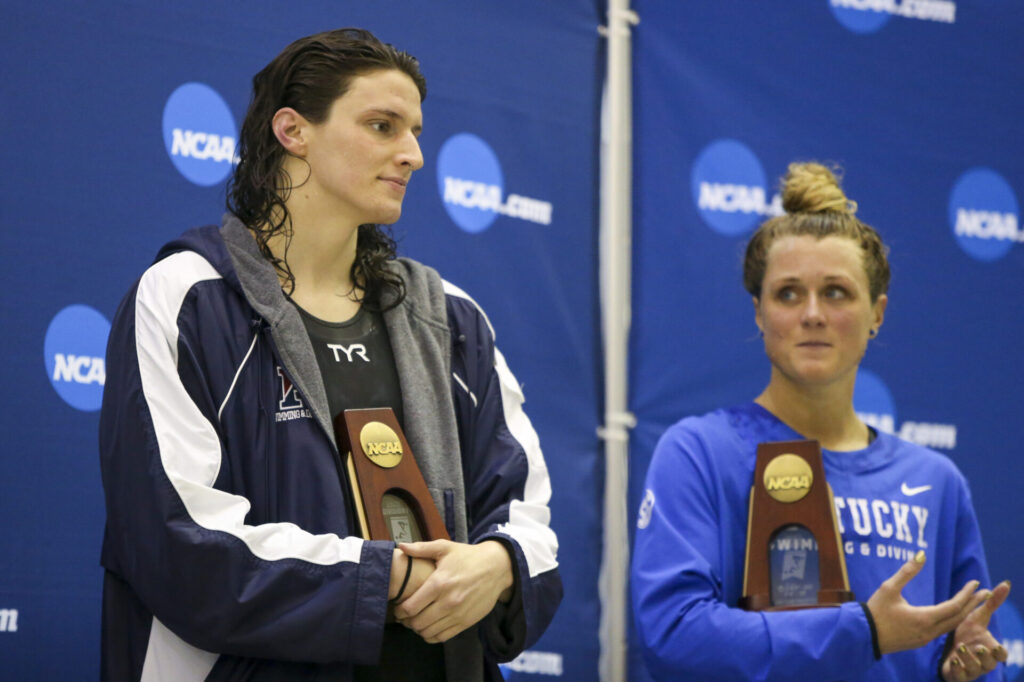NCAA President Charlie Baker came under fire on Tuesday during a Senate Judiciary Committee hearing after telling women’s college athletes they could use alternate locker room facilities if they felt uncomfortable sharing space with transgender athletes.
Baker’s remarks drew strong criticism from Republican senators who pressed him on the NCAA’s policies allowing transgender inclusion in women’s sports.
The hearing, which primarily focused on legalized sports gambling, took a sharp turn when Senator Josh Hawley (R-Mo.) questioned Baker about the NCAA policy that states “transgender student athletes should be able to use the locker room, shower, and toilet facilities in accordance with their gender identity.”

Celebrate Trump's Historic 2024 Victory with the Exclusive Trump 47th President Collection!
Baker, a former Republican governor of Massachusetts, responded by shifting the responsibility to other athletes. “Everybody else should have an opportunity to use other facilities if they wish to do so,” Baker said.
Baker added that the NCAA’s current guidelines allow colleges and institutions hosting NCAA events to make their own accommodations. “I believe our guidelines give people optionality in how they choose to use their facilities,” Baker said. “We told the local folks who hosted our tournaments that they need to make accommodations for the people who are playing.”
Listen to NCAA President Charlie Baker hem and haw and blame everyone from courts to “the locals” for HIS policy allowing men in women’s sports. It’s indefensible – and he knows it pic.twitter.com/gyFUm5qvJ0
— Josh Hawley (@HawleyMO) December 17, 2024
Baker initially resisted acknowledging that biological males have a physical advantage over female athletes.
Senator John Kennedy (R-La.) directly posed the question, asking if transgender athletes hold an inherent advantage.

Baker responded, “There’s not a lot of research on it, but it’s certainly debatable.”
When Kennedy pressed him a second time, asking whether “a biological male has an advantage every time competing against a biological female,” Baker shifted his stance. “I think the way you defined it, yes, I would agree with you,” Baker said.
Kennedy criticized Baker and the NCAA for failing to act. “Why don’t you go to Amazon and buy a spine online and take a stand?” Kennedy asked pointedly.
“Why don’t you go to Amazon and buy a spine online and take a stand?” – @SenJohnKennedy to NCAA President Charlie Baker
Senator Kennedy never misses 👏🏼🔥
pic.twitter.com/69WbsGVKV7— Riley Gaines (@Riley_Gaines_) December 17, 2024
Senator Marsha Blackburn (R-Tenn.) also criticized Baker for supporting policies that allow biological males to compete in women’s sports.
Following the hearing, the Concerned Women for America (CWA) issued a statement to Fox News Digital, condemning Baker’s comments.
Macy Petty, CWA’s legislative strategist, said, “Charlie Baker’s time as NCAA President has exposed a scandalous dismissal of the safety and dignity female athletes deserve. His lack of leadership has compromised the integrity of all member institutions, and his carelessness for Title IX protections endangers female athletes.”
During the hearing, Baker referenced “five lawsuits in the last 18 months” that have supported transgender inclusion.
MORE NEWS: Kamala’s Latest Word Salad Tries To Rally ‘Tired’ Dem Youth, Urges Them To ‘Fight’ [WATCH]
However, as Senator Hawley noted, no ruling explicitly mandates the NCAA to allow transgender athletes to compete against women or share women’s locker rooms.
Baker highlighted a November 2023 case where Colorado District Judge Kato Crews ruled in favor of San Jose State University volleyball player Blaire Fleming, a transgender athlete, allowing participation in the Mountain West Tournament.
Crews rejected a last-minute emergency injunction, stating the plaintiffs’ request “was not reasonable” and could “upend months of planning.”
The ruling focused on procedural concerns but did not address transgender inclusion on a larger scale.
Baker also pointed to rulings at the youth and high school levels, including a September decision in Arizona that blocked a state law preventing prepubescent transgender athletes from competing in girls’ sports and an April ruling in West Virginia permitting a 13-year-old transgender athlete to run in girls’ cross country.
Additional rulings in New Hampshire and Virginia earlier this year similarly allowed transgender athletes to compete on high school girls’ teams.
These cases, however, do not directly apply to NCAA-level athletics.
Meanwhile, two lawsuits are ongoing against the NCAA over its transgender inclusion policies.
Former NCAA swimmer Riley Gaines and other female athletes filed a lawsuit in Atlanta, accusing the NCAA of violating Title IX protections after being forced to share a locker room with transgender swimmer Lia Thomas during the 2022 championships.

Gaines described the situation as shocking and detailed the lack of warning given to female athletes.
In a separate case, San Jose State volleyball player Brooke Slusser, along with former coach Melissa Batie-Smoose and other Mountain West volleyball players, filed a lawsuit against the university and the conference.
The lawsuit alleges that allowing Blaire Fleming to compete as a woman, without informing teammates or opponents of Fleming’s biological sex, violated their rights.
Both lawsuits remain ongoing, as debate over transgender participation in women’s sports continues to escalate at both state and national levels.
Join the Discussion
COMMENTS POLICY: We have no tolerance for messages of violence, racism, vulgarity, obscenity or other such discourteous behavior. Thank you for contributing to a respectful and useful online dialogue.